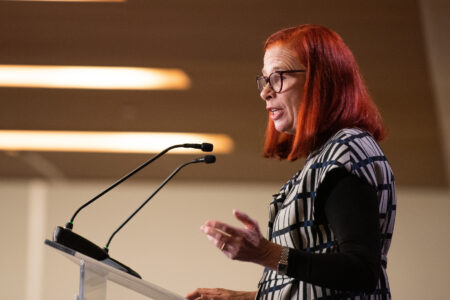
(This article has been translated from French.)
The hearings of the Canadian Radio-television and Telecommunications Commission (CRTC) for the renewal of the CBC/Radio-Canada’s broadcast licences were held from Jan. 11 to 28, 2021.
It was a strange situation, full of paradoxes. CBC/Radio-Canada’s management does not acknowledge the CRTC’s right to regulate its digital activities. We must recall that the CRTC itself took itself out of this field in 1999, when its chair, Françoise Bertrand, said, “The Internet is of no interest to us.” We all know the digital boom that has followed.
Since then, CBC/Radio-Canada has made a spectacular turn, having steadily increased its digital activities over the last 10 years or so. As well, this now generates significant advertising income. But the public broadcaster is not obligated to account for this to the CRTC.
Foreseeable developments
Two or three years from now, CBC/Radio-Canada and the CRTC will probably be affected by staggering changes. A new Broadcasting Act, replacing the current one enacted in 1991, may change the entire situation. The law may include the new digital world, which did not exist in the days of Marcel Masse, the minister of communications in Brian Mulroney’s Conservative government, who brought in the current act.
In January 2020, a group of experts, chaired by Janet Yale, charged by the ministry of Canadian heritage to examine the legislation on broadcasting and telecommunication released its report, which included a list of recommendations for the government. The main recommendation was that the CRTC should be empowered to regulate the entire digital world, including foreign entities like U.S. digital giants.
A first step in this direction may be Bill C-10, recently tabled by Canadian Heritage Minister Steven Guilbeault, adopted this year. In mid-January, he said: “Our intention with this Bill is to give our Canadian regulatory agency, the CRTC, the required authority to oblige these Web giants to invest in and respect Canada’s rules in this area.”
It thus follows the preliminary recommendations of the Yale report to give the CRTC regulatory authority over all digital media, foreign as well as Canadian.
Moreover, another of the Yale report’s recommendations proposed nothing short of CBC/Radio-Canada’s gradual retreat from carrying advertising on all its platforms. But the public broadcaster’s management has in no way reacted. How can it ignore these legislative and regulatory omens that will upset the entire media landscape?
The CRTC: what about the fundamental questions?
Notable at the CBC/Radio-Canada licence renewal hearings was the commissioners’ and the chair’s requests for clarification on these matters: do you have performance indicators or program ratings on digital platforms? Do you have performance indicators of diversity in programming, or the involvement of LGBTQ people among staff and senior management? What are your performance measures? These were the recurring questions from the commissioners.
But I never heard anyone raising the fundamental questions: what are CBC/Radio-Canada’s mandate and mission? How do you see yourself in three or five years if your advertising revenue drops? How should you be relating with your privately owned competition? These vital questions about the mission of the public broadcasting service were never addressed.
In the meantime, the major digital giants keep extending their reach. For example, Netflix has reached record subscriptions in Canada and in Quebec since the start of the pandemic. As well, a new player has landed in the Quebec television field: Bell Media’s Noovo, which will jostle Radio-Canada’s and TVA’s share of the francophone market. This will affect both the traditional and the digital platforms. In such an environment, what “distinctiveness” will Radio-Canada offer to audiences? As I wrote upon my 2012 departure from Radio-Canada, “What is the public service for if it just does what others do?”
Radio-Canada: the tussle between commercialization and content
I am obviously committed to a strong and well-funded broadcasting service, since we will certainly need one to compete with the Web giants. To combat misinformation, significant resources must be invested in a reliable news service. Similarly, resources will also be needed to support our culture, especially the francophone culture of Quebec, Acadia and the rest of the country. We get daily reminders from the American Web giants that we are a minority in North America. We should be empowered to support this culture and to celebrate it. I am convinced that Radio-Canada is the best asset we have to defend francophone news and culture.
CBC/Radio-Canada’s president and CEO, Catherine Tait, and its vice-president of French services, Michel Bissonnette, have expressed their wish for CBC to constitute a defense against Netflix and the Web giants. This is what I, too, have wanted for many years. CBC is a jewel; it can indeed be our defense against domination by the American Web giants.
To combat this trend, CBC must be more distinct, more different than it has been for several years. Why? Because the emphasis on commercialization in favour of program content has diminished our distinctiveness. There is now more advertising on television, even on all digital platforms. In fact, there is a constant search for new and creative ways to generate extra advertising revenue. Like it or not, this inevitably affects CBC/Radio-Canada’s program content and image.
And this is why CBC/Radio-Canada is pushing the boundaries even further by launching this unfortunate advertising service called Tandem, which “produces content for advertisers, such as scripts, tunes and videos.” But why?
This is how the revenue group, which includes media advertising sales, distribution, marketing and revenue optimization, now has 300 employees in pursuit of commercial and advertising revenue to satisfy customers. Let’s be clear: this CBC department looms too large; we are making more business and not enough public content.
And this is why CBC/Radio-Canada is pushing the boundaries even further by launching this unfortunate advertising service called Tandem, which “produces content for advertisers, such as scripts, tunes and videos.” But why? They respond that all broadcasters and publishers do it. But shouldn’t CBC/Radio-Canada distinguish itself by not imitating the disguised advertising practices of privately owned media?
In fact, this shows that the quest for advertising income at any price will taint and pervert the image of a public service (except, happily, news programs, which have resisted). This is why I believe CBC should pull out of advertising in its programming, as recommended by the Yale report.
The hearing’s last day was disappointing. CBC/Radio-Canada had the opportunity to respond to intervenors’ complaints. But it did not do so. For example, despite the fears expressed by a dozen intervenors of the Tandem initiative, not a single question on this subject was put to CBC/Radio-Canada management. And the hearings ended without the commissioners addressing any fundamental issues. Instead, they wasted time with questions on dubbing children’s programs. Yes, but …?
But what of providing distinctive content? Almost not a word on this, as if there were no pressing need to rethink the mandate and mission of CBC/Radio-Canada.
Many other issues also went unaddressed, such as: what are the methods for calculating data to qualify a program to be of national interest? What are the measurements to prove diversity in a program or in management?
Having watched the hearings in their entirety, I can only conclude the commissioners are in total denial. True, they favour movement toward digital for the new generation, which is commendable and essential. But what of providing distinctive content? Almost not a word on this, as if there were no pressing need to rethink the mandate and mission of CBC/Radio-Canada. We are keeping the status quo in the new digital age, nothing more. But this issue must be debated one day. How can our public broadcaster distinguish itself if its dependence on advertising is as dominant or, I dare say, decisive?
The transition will foster the installation of a new legislative and regulatory framework. It will also permit CBC/Radio-Canada’s management to be proactive and to reflect on a new type of public service, perhaps without advertising and with a new business model. It would be better to get there by constructively taking part in discussions of the future. Until then, we should all rack our brains to devise other ways to fund the public service.
This is the right time to have this debate. We have been waiting 30 years for a new law on broadcasting and on CBC/Radio-Canada. The public broadcaster can and should play a major part in the culture and information needs of francophones. This is urgent. FAAMG (the 5 U.S. tech giants) won’t stand still.
Photo : The new Maison de Radio-Canada in Montreal, which opened in 2020. Shutterstock / meunierd









